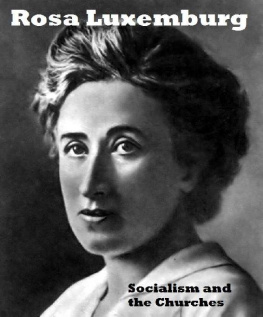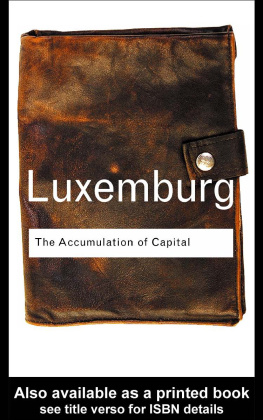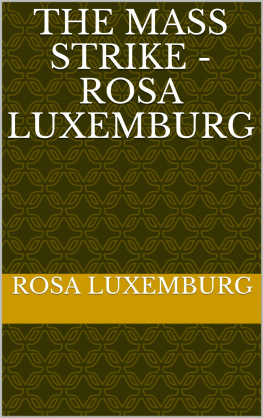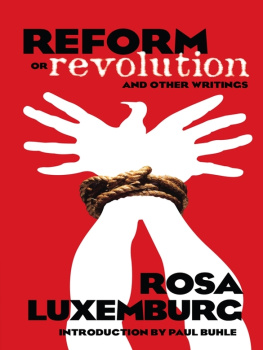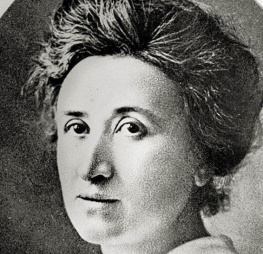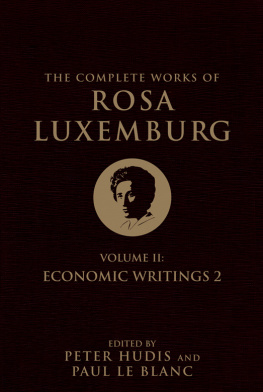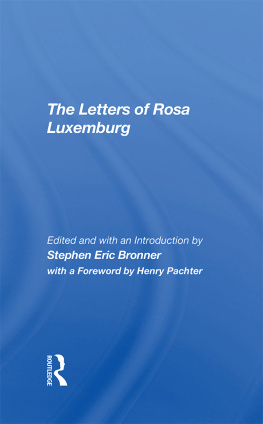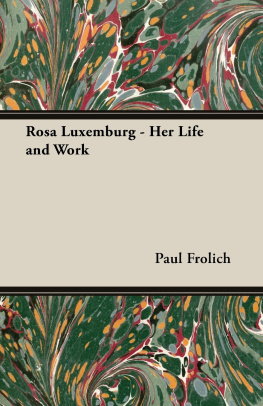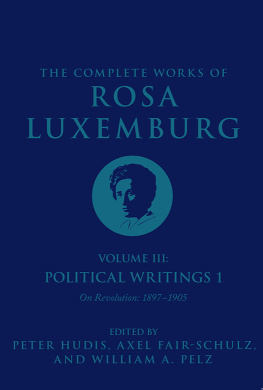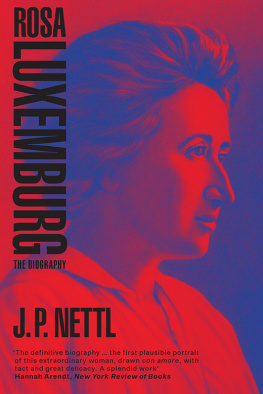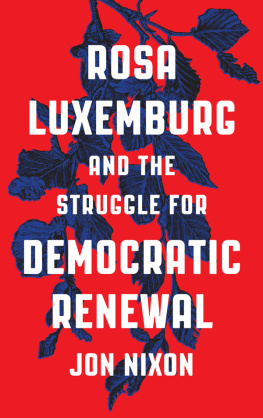Rosa Luxemburg - Socialism and the Churches
Here you can read online Rosa Luxemburg - Socialism and the Churches full text of the book (entire story) in english for free. Download pdf and epub, get meaning, cover and reviews about this ebook. year: 2011, publisher: Marxist Internet Archive, genre: Politics. Description of the work, (preface) as well as reviews are available. Best literature library LitArk.com created for fans of good reading and offers a wide selection of genres:
Romance novel
Science fiction
Adventure
Detective
Science
History
Home and family
Prose
Art
Politics
Computer
Non-fiction
Religion
Business
Children
Humor
Choose a favorite category and find really read worthwhile books. Enjoy immersion in the world of imagination, feel the emotions of the characters or learn something new for yourself, make an fascinating discovery.
- Book:Socialism and the Churches
- Author:
- Publisher:Marxist Internet Archive
- Genre:
- Year:2011
- Rating:3 / 5
- Favourites:Add to favourites
- Your mark:
- 60
- 1
- 2
- 3
- 4
- 5
Socialism and the Churches: summary, description and annotation
We offer to read an annotation, description, summary or preface (depends on what the author of the book "Socialism and the Churches" wrote himself). If you haven't found the necessary information about the book — write in the comments, we will try to find it.
Socialism and the Churches — read online for free the complete book (whole text) full work
Below is the text of the book, divided by pages. System saving the place of the last page read, allows you to conveniently read the book "Socialism and the Churches" online for free, without having to search again every time where you left off. Put a bookmark, and you can go to the page where you finished reading at any time.
Font size:
Interval:
Bookmark:
Written: 1905.
First Published: by the Polish Social Democratic Party in 1905.
Source: A Russian edition appeared in Moscow in 1920. A French edition was issued by the French Socialist Party in 1937. First English Edition published by Socialist Review, Birmingham. The text here is reproduced from the 1979 Colombo edition. Copyright free status is verified by a 1972 publication of the same translation, by Merlin Press, without Copyright notice.
Translated: from the French by Juan Punto.
Transcription/Markup: Youth for International Socialism/Brian Baggins.
Ebook Conversion: Todd Tavares
Copyleft: Luxemburg Internet Archive (marxists.org) 2003. Permission is granted to copy and/or distribute this document under the terms of the GNU Free Documentation License.
The Marxists Internet Archive (MIA, http://www.marxists.org/) is an all-volunteer, non-profit public library that was started in 1990. MIA contains the writings of 592 authors representing a complete spectrum of political, philosophical, and scientific thought, generally spanning the past 200 years. MIA contains these writings in 45 different languages, comprising a total size of over 53,000 documents and 29 GB of data, all created through the work of volunteers around the world.
From the moment when the workers of our country and of Russia began to struggle bravely against the Czarist Government and the capitalist exploiters, we notice more and more often that the priests, in their sermons, come out against the workers who are struggling. It is with extraordinary vigour that the clergy fight against the socialists and try by all means to belittle them in the eyes of the workers. The believers who go to church on Sundays and festivals are compelled, more and more often, to listen to a violent political speech, a real indictment of Socialism, instead of hearing a sermon and obtaining religious consolation there. Instead of comforting the people, who are full of cares and wearied by their hard lives, who go to church with faith in Christianity, the priests fulminate against the workers who are on strike, and against the opponents of the government; further, they exhort them to bear poverty and oppression with humility and patience. They turn the church and the pulpit into a place of political propaganda.
The workers can easily satisfy themselves that the struggle of the clergy against the Social-Democrats is in no way provoked by the latter. The Social-Democrats have placed themselves the objective of drawing together and organizing the workers in the struggle against capital, that is to say, against the exploiters who squeeze them down to the last drop of blood, and in the struggle against the Czarist government, which holds the people to ransom. But never do the Social-Democrats drive the workers to fight against clergy, or try to interfere with religious beliefs; not at all! The Social-Democrats, those of the whole world and of our own country, regard conscience and personal opinions as being sacred. Every man may hold what faith and what opinions seem likely to him to ensure happiness. No one has the right to persecute or to attack the particular religious opinion of others. That is what the socialists think. And it is for that reason, among others, that the socialists rally all the people to fight against the Czarist regime, which is continually violating mens consciences, persecuting Catholics, Russian Catholics,[1] Jews, heretics and freethinkers. It is precisely the Social-Democrats who come out most strongly in favour of freedom of conscience. Therefore it would seem as if the clergy ought to lend their to the Social-Democrats who are trying to enlighten the toiling people. If we understand properly the teachings which the socialists bring to the working class, the hatred of clergy towards them becomes still less understandable.
The Social-Democrats propose to put an end to the exploitation of the toiling people by the rich. You would have that the servants of the Church would have been the first to make this task easier for the Social-Democrats. Did Jesus Christ (whose servants the priests are) teach that it is easier for a camel to pass through the eye of a needle than for a rich man to enter the Kingdom of Heaven?[2] The Social-Democrats try to bring about in all countries social regimes based on the equality, liberty and fraternity of all the citizens. If the clergy really desire that the principle Love thy neighbour as thyself be applied in real life why do they not welcome keenly the propaganda of the Social Democrats? The Social Democrats try, by a desperate struggle, by the education and organization of the people, to draw them out of the downtrodden state in which they now are and to offer a better future to their children. Everyone should admit, that at this point, the clergy should bless the Social-Democrats, for did not he whom they serve, Jesus Christ, say That you do for the poor you do for me?[3]
However we see the clergy on the one hand, excommunicating and persecuting the Social-Democrats, and, on the other hand, commanding the workers to suffer in patience, that is, to let themselves patiently be exploited by the capitalists. The clergy storm against the Social Democrats, exhort the workers not to revolt against the overlords, but to submit obediently to the oppression of this government which kills defenceless people, which sends to the monstrous butchery of the war millions of workers, which persecutes Catholics, Russian Catholics and Old Believers.[4] Thus, the clergy, which makes itself the spokesman of the rich, the defender of exploitation and oppression, places itself in flagrant contradiction to the Christian doctrine. The bishops and the priests are not the propagators of Christian teaching, but the worshippers of the Golden Calf[5] and of the Knout which whips the poor and defenceless.
Again, everyone knows how the priests themselves make profit from the worker, extract money out of him on the occasion of marriage, baptism or burial. How often has it happened that the priest, called to the bedside of a sick man to administer the last sacraments, refused to go there before he had been paid his fee? The worker goes away in despair, to sell or pawn his last possession, so as to be able to give religious consolation to his kindred.
It is true that we do meet churchmen of another kind. There exist some who are full of goodness and pity and who do not seek gain; these are always ready to help the poor. But we must admit these are indeed uncommon and that they can be regarded in the same way as white blackbirds. The majority of priests, with beaming faces, bow and scrape to the rich and powerful, silently pardoning them for every depravity, every iniquity. With the workers the clergy behave quite otherwise: they think only of squeezing them pity; in harsh sermons they condemn the covetess of the workers when these latter do no more than defend themselves against the wrongs of capitalism. The glaring contradiction between the actions of the clergy and teachings of Christianity must make everyone reflect. The workers wonder how it comes about that the working class in its struggle for emancipation, finds in the servants of the Church, enemies and not allies. How does it happen that the Church plays the role of a defence of wealth and bloody oppression, instead of being the refuge of the exploited? In order to understand this strange phenomenon, it is sufficicent to glance over the history of the Church and to examine the evolution through which it has passed in the course of the centuries.
The Social-Democrats want to bring about the state of communism; that is chiefly what the clergy have against them. First of all, it is striking to notice that the priests of today who fight against Communism condemn in reality first Christian Apostles. For these latter were nothing else than ardent communists.
Font size:
Interval:
Bookmark:
Similar books «Socialism and the Churches»
Look at similar books to Socialism and the Churches. We have selected literature similar in name and meaning in the hope of providing readers with more options to find new, interesting, not yet read works.
Discussion, reviews of the book Socialism and the Churches and just readers' own opinions. Leave your comments, write what you think about the work, its meaning or the main characters. Specify what exactly you liked and what you didn't like, and why you think so.

